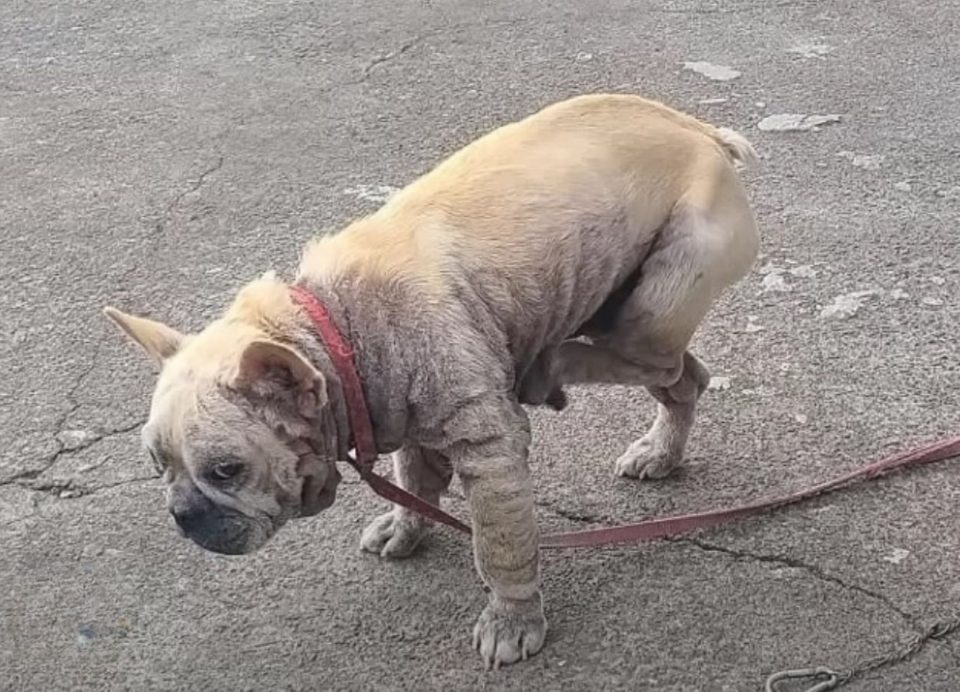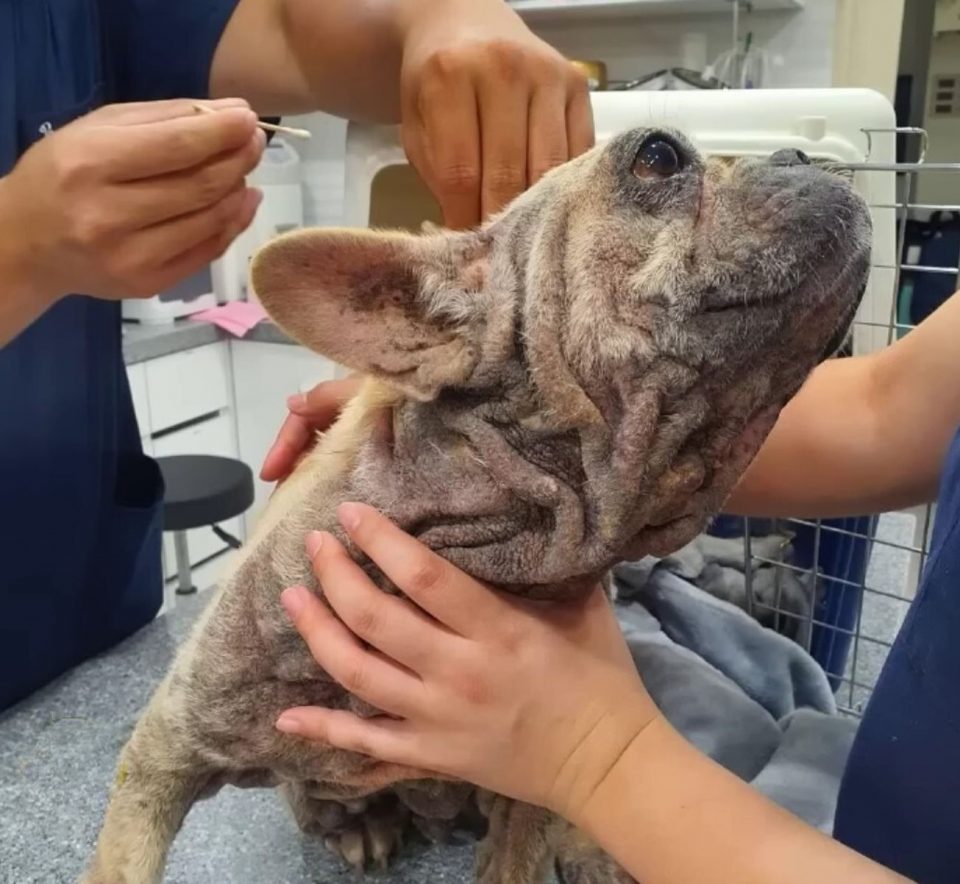We live in a time where empathy is increasingly losing its value. People show this every day with their inhumane actions, and many stories about abandoned, neglected, and abused animals are the best proof of this.
One of them is the story of a forgotten dog whose owner, whom she trusted the most, heartlessly dumped her in front of a store. The owners of the store couldn’t afford to take her home, so she desperately waited for four years for her favourite human to come back for her.
However, just when she started to lose hope that she would ever experience happy moments in a warm home again, a good soul appeared and changed her life forever.
So Much Suffering

When the kind-hearted woman came across this poor abandoned canine, her heart was broken because of her unfortunate fate. She didn’t wait a minute but immediately decided to help her.
After she brought her home, this woman realized that the dog was in horrible condition. Her skin was so keratinized that her blood vessels couldn’t be seen at all. She also had an awful odor, which was no wonder, considering how much time she spent without care.
The woman rushed her to the vet so that she could start to recover as soon as possible. When this poor dog came to the clinic, she sobbed in pain. On top of everything, the doctors also found wounds on her body. This was a sign that other people also treated her badly.

Her saviour was so heartbroken because of this that she couldn’t stop crying. However, the vets cheered her up a bit when they told her that everything would be fine and that she would make it.
The vets gave her the necessary medications and injections, as well as a proper bath after such a long time. They told her rescuer that she could go home but that she had to rest and take prescribed medication for a long time until she fully recovered.

Her foster mom took her recovery seriously and provided her with everything she needed, from medicine and food to a warm bed. However, what helped this dog the most was unconditional human love and a sense of security after four long years of loneliness and despair.
Better days were coming for this sweet little pup.
Finally Happy

After a long and difficult recovery, this dog finally began to show her true colors. Her health condition was stable, and her skin, which was originally like a desert, began to grow hair as white as rice. This is exactly what inspired her foster mom to name her Rice.
Once an abandoned, sick, and sad dog, Rice was finally shining in her full glory. Apart from the fact that she completely recovered in terms of health and became a real little beauty, the wounds on her soul also healed.
That was enough for a big smile to appear on her face, which she hadn’t taken off since that moment. Her positive energy attracted everyone, from people to other canines, and everybody loved her so much.

Rice lived her happiest moments with the person who saved her from the darkness and was her support when it was the hardest. She and her savior were a balm to each other’s souls.
Nevertheless, the moment of parting was approaching, and it was inevitable. One family fell in love with Rice and her life story so much that they decided to adopt her.
When her saviour hugged Rice for the last time, her eyes were full of tears. However, she knew that this was the only way Rice could meet her happiest ending, so it was easier for her to accept it.
She knew that Rice would forever live in her heart as she would in hers. And, if Rice ever feels lonely again, this dog will know where to find love and solace because the door of her saviour’s heart will always be open for her.
If you’re a dog parent, you know that our furry friends can sometimes leave us surprises in the form of vomit. It’s not the most pleasant topic to discuss, but understanding why dogs vomit is essential for their well-being. As an experienced dog trainer, I’ve encountered this issue more times than I can count, and trust me, there’s more to it than meets the eye.
Picture this: you’re enjoying a peaceful evening with your pup, and suddenly, they start retching. It’s a moment that can send any dog owner into a frenzy. But before you hit the panic button, it’s crucial to know the reasons behind this common canine occurrence. Stay tuned as we unravel the mystery behind why dogs vomit and how you can help your furry companion feel better.
Understanding Vomiting in Dogs
If your furry buddy suddenly starts vomiting, it can be a concerning situation. Let’s dig into why this happens and how you can understand and differentiate various aspects of vomiting.
Common Causes of Vomiting
Dogs can throw up for various reasons, such as eating too fast, consuming something indigestible, or having an underlying health issue. It’s essential to pay attention to any changes in their diet or environment.
The Difference Between Vomiting and Regurgitation
While vomiting involves the forceful expulsion of stomach contents, regurgitation is a passive process where undigested food comes back up without any retching. Understanding this dissimilarity can help you assess your dog’s condition more accurately.
When to Be Concerned About Your Dog’s Vomiting
Signs of Serious Illness
If your dog vomits persistently and shows signs of weakness, lethargy, dehydration, abdominal pain, or blood in vomit, it could indicate a serious underlying issue. Prompt veterinary attention is crucial in such cases to identify and address potential health concerns.
Vomiting in Puppies vs. Adult Dogs
While occasional vomiting can be common in both puppies and adult dogs, it’s essential to note differences in their tolerance levels. Puppies are more susceptible to dietary indiscretions, infections, and parasites, whereas adult dogs may experience vomiting due to dietary allergies, foreign object ingestion, or organ dysfunction. Monitoring the frequency, duration, and associated symptoms can help differentiate between normal and concerning vomiting episodes.
Diagnosing the Cause of Vomiting
The Vet’s Role in Assessment
If your dog is vomiting, it’s essential to consult a vet for a proper assessment. Vets have the expertise to diagnose the reason behind your dog’s vomiting accurately. They will conduct a thorough examination to determine if the vomiting is due to a minor issue like dietary indiscretion or a more severe underlying health problem.
Tests That May Be Carried Out
During the assessment, the vet may recommend specific tests to identify the cause of your dog’s vomiting. These tests could include blood work, fecal analysis, X-rays, or even ultrasound scans. These diagnostic tests help the vet narrow down potential reasons for the vomiting, ensuring the correct treatment plan is implemented promptly.
Treatment and Management of Vomiting in Dogs
Home Care Strategies
When it comes to helping your furry friend at home, there are some simple strategies you can use. Firstly, ensure your dog has access to water at all times to prevent dehydration. You can also try feeding smaller, more frequent meals to help reduce the chances of vomiting. Additionally, keeping your dog calm and stress-free can aid in preventing episodes of vomiting. If you suspect that a sudden change in diet might be the cause, gradually reintroduce their regular food to see if the vomiting stops.
Medical Treatments Available
If your dog’s vomiting persists or is accompanied by other concerning symptoms, it’s crucial to seek professional veterinary care. Veterinarians have various medical treatments at their disposal to address vomiting in dogs. Depending on the underlying cause, your vet may recommend medications to alleviate nausea or treat infections. In severe cases, your vet may suggest intravenous fluids to prevent dehydration or other interventions to manage the primary cause of vomiting.
Remember, always consult your veterinarian for an accurate diagnosis and appropriate treatment plan when your dog is experiencing vomiting. Your vet is best equipped to provide tailored care for your beloved pet’s specific needs.
Preventing Vomiting in Dogs
Dietary Considerations
When it comes to preventing vomiting in dogs, paying attention to their diet is crucial. Stick to a regular feeding schedule and avoid sudden changes in their food. Opt for high-quality, easily digestible food to reduce the chances of upset stomachs. Additionally, avoid feeding your dog table scraps or foods that are toxic to them like chocolate, onions, or grapes. Providing your furry friend with a balanced diet can help prevent unnecessary vomiting episodes.
Reducing Stress and Anxiety
Stress and anxiety can sometimes trigger vomiting in dogs. Ensure your dog has a safe and comfortable space at home where they can relax. Regular exercise and mental stimulation can help reduce stress levels. If your dog exhibits signs of anxiety, such as pacing or excessive panting, consider using calming techniques like soothing music or pheromone diffusers. Creating a peaceful environment for your dog can go a long way in preventing stress-induced vomiting.
Conclusion
Understanding why dogs vomit is essential for their well-being. Distinguishing between vomiting and regurgitation, identifying causes, and seeking prompt veterinary care are crucial. Preventive measures such as a regular feeding schedule, quality food, and stress management techniques can help minimize vomiting episodes. Remember, consulting a vet for a tailored treatment plan is key to keeping your furry friend healthy and happy. Stay informed, proactive, and attentive to your dog’s needs to ensure a vibrant and joyful life together.
Frequently Asked Questions
Why do dogs vomit?
Dogs vomit for various reasons, including eating too fast, dietary indiscretion, infections, parasites, toxins, or underlying health issues.
How can I differentiate between vomiting and regurgitation in dogs?
Vomiting involves active abdominal contractions, while regurgitation is more passive with undigested food coming up without effort.
When should I seek professional care for my dog’s vomiting?
If your dog is vomiting persistently, has blood in vomit, is lethargic, or shows other concerning symptoms, seeking prompt vet care is crucial.
What preventive measures can I take to avoid my dog vomiting?
Maintain a regular feeding schedule, ensure access to high-quality food and water, minimize stress, and consult your vet for dietary recommendations.
How can stress and anxiety trigger vomiting in dogs?
Stress and anxiety can disrupt a dog’s digestive system, leading to vomiting. Creating a calm, safe environment and using calming techniques can help reduce stress-induced vomiting.
Why is consulting a vet essential for treating vomiting in dogs?
Vets can provide an accurate diagnosis, recommend necessary tests, and tailor a treatment plan based on your dog’s specific needs, ensuring their overall health and well-being.
[no_toc]

Hey there, I’m Janet Brooks, a dog-loving student from California. I’m all about helping pups in need, especially those without homes. Me and my awesome friends work together to give shelter and love to stray dogs. Oh, and I also write blogs about dogs to share helpful info.